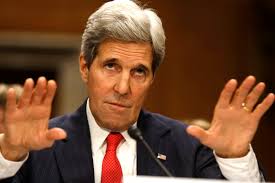Military Scholar Critiques John Kerry’s Position On Gay Ban
Historically Supportive of Gay Rights, Kerry Still Says Gay Ban “Could Work”
SANTA BARBARA, CA, – A Military Scholar who studies the U.S. military’s ban on openly gay soldiers raised concern recently over remarks by a leading Democratic presidential contender, Massachusetts Sen. John Kerry, about the “Don’t Ask, Don’t Tell” policy. In an interview with In Los Angeles magazine, Sen. Kerry expressed opposition to the policy on gay soldiers, but stopped short of a promise to work to end the ban if he were elected president.
When asked if he would “challenge” the policy, he said, “you can’t do it right now because it’s an Administrative issue, an executive issue.” He also said the ban “could work if it’s applied properly… they’re simply not following the policy.” When asked if he would “act to eradicate the policy,” he said he would “take steps to try to guarantee that we have fair access to service in the military for everybody in America with no holds barred.”
Dr. Aaron Belkin, Director of the Center for the Study of Sexual Minorities in the Military at the University of California, Santa Barbara, questioned the meaning of Sen. Kerry’s assertion that the ban could work if it were “applied properly.” He said that whether the ban “could work” depends on what the goals of the ban are. “What it has clearly worked to do,” he said, “is to swell the number of discharges and encourage anti-gay harassment by discouraging victims from speaking out for fear of reprisals.” In some instances, a report of harassment has prompted an investigation into the victim’s sexual orientation instead of the behavior of the accused.
Belkin disputed Sen. Kerry’s contention that the gay ban was an administrative issue. He explained that the current policy, implemented in 1994, was passed by Congress and is thus federal statute. Rather than being an executive issue, then, Congress would need to act in order to lift the ban.
Despite his current unwillingness to challenge the ban directly, Human Rights Campaign (HRC), the country’s largest gay rights lobbying group, gave Sen. Kerry a 100% approval rating. David Smith, a spokesperson for HRC, said that the senator “clearly opposes a ‘don’t ask, don’t tell,’” citing supportive remarks he made in 1993 on the senate floor for ending the ban altogether.
But Dr. Belkin noted a more proactive effort to repeal the ban when a colleague of Sen. Kerry’s, Sen. Russ Feingold, spoke out against the policy on the senate floor last month. Sen. Feingold faulted the policy for firing critically needed Arabic translators simply because they were gay, and called for an end to the ban. “Our military should cease the discriminatory and counter-productive policy of discharging competent military personnel simply because of their sexual orientation,” he said.
This week, Sen. Kerry is expected to attend a fundraiser with gay groups in Washington, where he could face additional questioning about his position on gays in the military.
